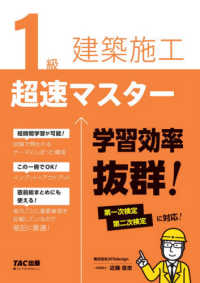- ホーム
- > 洋書
- > 英文書
- > Politics / International Relations
Full Description
Some planners limit discussions of ethics to simple, though important, questions about the propriety of their daily activities. This approach to ethics restricts discussion of professional ethics to the propriety of everyday social and professional relationships. It ignores the broader ethical content of planning practice, methods, and policies. While narrow definitions of ethical behavior can easily preoccupy public officials and professional associations, they divert attention from more profound moral issues.Martin Wachs argues that ethical issues are implicit in nearly all planning decisions. For illustrative and educational reasons, it is useful to divide ethics in planning into four distinct categories. The first category includes the moral implications of bureaucratic practices and rules of behavior regarding clients and supervisors. The second category includes ethical judgments which planners make in exercising their "administrative discretion." More complex, and represented by a third category, are the moral implications of methods and the ethical content of criteria built into planning techniques and models. The final type represents the basic choices which society makes - those inherent in the consideration of major policy alternatives.Ethics in Planning contains a variety of representative papers to capture the current state of thinking. This book will be important as a text for survey classes in professional ethics given by university planning programs. It should also supplement short courses in planning ethics for practicing professionals and provide source materials for discussions of planning ethics sponsored by local chapters of the American Planning Association and similar organizations. It gathers together exemplary and critical works, thus it will also interest individual planners in a field that only continues to grow in recognition and importance.
Contents
Introduction; I: Overview of Ethical Issues in Urban Planning and Administration; 1: Professional Ethics and Beyond: Values in Planning; 2: The Ethics of Contemporary American Planners; 3: Foundations for Normative Planning; 4: The Structure of Ethical Choice In Planning Practice; 5: Realms of Obligation and Virtue; II: Corruption and Whistle-Blowing in Planning Organizations; 6: Corruption and Reform in Land-Use and Building Regulation: Incentives and Disincentives; 7: Corruption as a Feature of Governmental Organization *; 8: Whistle Blowing: Its Nature and Justification; 9: Ethical Dilemmas in Government: Designing an Organizational Response; III: Ethical Issues in Policymaking; 10: The Place of Principles in Policy Analysis; 11: Utilitarianism and the Presuppositions of Cost-Benefit Analysis: An Essay on the Relevance of Moral Philosophy to the Theory of Bureaucracy; 12: Cost-Benefit Analysis and Environmental, Safety, and Health Regulation: Ethical and Philosophical Considerations; 13: Ethical Dilemmas in Forecasting for Public Policy; 14: Normative Criteria for Organizational Discourse: A Methodological Approach; IV: The Emergence of an Environmental Ethic; 15: Land Planning in an Ethical Perspective; 16: Is There an Ecological Ethic?; 17: Are We Ready for an Ecological Morality?








